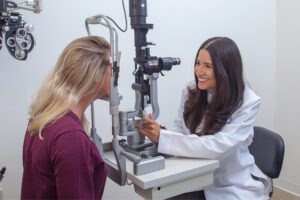Elmquist Eye Group says early diagnosis is key to treatment, preventing vision loss
 Cancer, in any form, is a scary diagnosis. Coping with loss of vision, even in mild forms, is life changing, as our bodies rely heavily on visual cues to interact with our peers and complete daily tasks. When cancer affects the eye, early detection is critical in preserving vision.
Cancer, in any form, is a scary diagnosis. Coping with loss of vision, even in mild forms, is life changing, as our bodies rely heavily on visual cues to interact with our peers and complete daily tasks. When cancer affects the eye, early detection is critical in preserving vision.
Intraocular cancers occur within the eye, with the most common cancers for adults including melanoma and Non-Hodgkin lymphoma. The American Cancer Society estimates 3,320 new cancers of the eye and orbit will occur in the U.S. in 2021, mainly melanomas, resulting in 400 deaths.
Melanoma is the most common cancer of the eye and typically develops in the middle layer of the eye, called the uvea, or less commonly in the conjunctiva near the front of the eye. Melanoma can also occur in the eyelid and tissues surrounding the eye.
The most common symptom of intraocular cancer is loss of vision, in addition to flashes of light, floating objects and dark spots on the eyes. However, these symptoms can easily go undetected, especially in the early stages of cancer.
“Ocular cancer can occur without noticeable warning signs,” said Dr. Yasaira Rodriguez, a comprehensive ophthalmologist for Elmquist Eye Group. “Many times, the first signs of cancer are discovered during routine eye exams.”
A comprehensive eye exam is typically the first step in diagnosing ocular cancer. If cancer is suspected, additional procedures will be completed in order to confirm the diagnosis, including imaging tests, biopsy and blood tests.
Treatment following an ocular cancer diagnosis aims to reduce the spread of the tumor in order to preserve vision and health of the eye. Treatment methods will depend on the type of cancer and its progression and may involve surgery, radiation, chemotherapy, laser therapy or other medications.
Cancer treatments affect all individuals differently, and side effects may occur with fluctuating levels of severity. That’s why it is essential to be aware of your body’s changes throughout the course of treatment and disclose any symptoms to your physician, oncologist or eye doctor.
An examination prior to starting cancer treatment will provide your eye care professional with a reliable baseline for your eye health that will assist them in monitoring changes and any new developments throughout the course of your treatment. Those undergoing treatment for any type of cancer are encouraged to have regular eye exams every three to 12 months.
“A proactive approach allows your eye care team to properly monitor eye health and manage treatment related eye conditions in their early stages, helping minimize discomfort and prevent symptoms from escalating,” said Dr. Kate Wagner, board certified optometrist and managing partner at Elmquist Eye Group.
Eye cancer can occur at any age, but several factors can contribute to your risk of developing this disease. Risk increases with age and is more common in men than women, among white people and for those with light-colored eyes. Genetic conditions and family history of cancer also contribute. Additionally, overexposure to the sun’s damaging ultraviolet (UV) radiation is an ever-present danger to our eye health, especially in sunny Southwest Florida. Studies have shown that long-term overexposure to UV rays without proper eye protection can cause melanoma and skin cancer around the eyelids, in addition to a variety of conditions including cataracts, macular degeneration and small growths on the white of the eye. These conditions are propelled by UV radiation and can often result in vision loss, requiring treatment or even surgery to repair the damage.
While cancer cannot be prevented, you can take steps to lower your risk. Make an effort to protect your eyes by wearing wide-brimmed hats, UV-blocking contact lenses and close-fitting, UV-blocking sunglasses that will protect your eyes and prevent long-term damage. When skin growths or moles develop around the eyes, seek medical consultation.
Take proactive strides today to preserve your vision for the future. Promote the health of your eyes by scheduling an eye exam with Elmquist Eye Group’s team of highly skilled associates.
With more than 25 years of service to the Southwest Florida community, Elmquist Eye Group offers experienced doctors who are dedicated to patient care. Dr. E. Trevor Elmquist, Dr. Kate Wagner, Dr. Sarah Eccles-Brown, Dr. Nina Burt and Dr. Yasaira Rodriguez of Elmquist Eye Group are available to answer your questions. With three U.S. military veterans leading the practice, Elmquist Eye Group’s team stands ready to serve you right here in Southwest Florida.
For more information, visit www.Elmquist.com, call 239-936-2020 or schedule an appointment at an Optical Boutique location in Fort Myers or Cape Coral.









